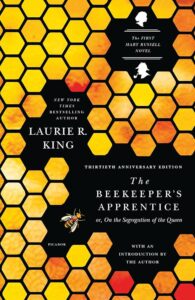 Every writer of historical mystery fiction writes in the shadow of Ellis Peters, whose first Brother Cadfael novel was published in 1975, and Elizabeth Peters, whose first Amelia Peabody novel was published the same year. Elizabeth Peters, an incredibly influential figure, created not only the historical cozy-slash-adventure novel, she also foregrounded a woman as the central figure. Anne Perry’s first Pitt novel was published in 1979. There was, in other words, a cluster of work, a zeitgeist. This pop zeitgeist worked it’s way through mystery fiction for the next 20 or so years, and with the publication of The Beekeeper’s Apprentice in 1994, Laurie R.King upended the historical mystery genre once again. Once again there was a cluster of novels written around the same time – Sharan Newman’s Death Comes as Epiphany (1993), Margaret Frazer’s The Novice’s Tale (1992) and Candace Robb’s The Apothecary Rose (1993) – all of which featured, as King’s novel does, a woman at the center of the action.
Every writer of historical mystery fiction writes in the shadow of Ellis Peters, whose first Brother Cadfael novel was published in 1975, and Elizabeth Peters, whose first Amelia Peabody novel was published the same year. Elizabeth Peters, an incredibly influential figure, created not only the historical cozy-slash-adventure novel, she also foregrounded a woman as the central figure. Anne Perry’s first Pitt novel was published in 1979. There was, in other words, a cluster of work, a zeitgeist. This pop zeitgeist worked it’s way through mystery fiction for the next 20 or so years, and with the publication of The Beekeeper’s Apprentice in 1994, Laurie R.King upended the historical mystery genre once again. Once again there was a cluster of novels written around the same time – Sharan Newman’s Death Comes as Epiphany (1993), Margaret Frazer’s The Novice’s Tale (1992) and Candace Robb’s The Apothecary Rose (1993) – all of which featured, as King’s novel does, a woman at the center of the action.
Newman’s Catherine LeVendeur is especially groundbreaking as she portrays the life of a nun living under the care of Abbess Heloise (of Heloise and Abelard fame) who eventually breaks with the religious life to marry. King brought this idea of a female protagonist into more of the popular culture realm with her introduction of Sherlock Holmes as one of the central characters. I love Newman’s work, but a medieval setting appeals to a much smaller audience than Holmes does. He’s the entry ticket to this glorious series, which really follows a young woman’s coming of age.
Laurie King is nothing if not the master of the set up. Every novel of hers, from Beekeeper’s to A Grave Talent (the first Kate Martinelli) to her recent, brilliant standalone, Back to the Garden, has a set up that grabs your attention immediately. The set up for Beekeeper’s outshines all of them, however. In it a young woman, Mary Russell, is walking across the Sussex Downs in the year 1914 when she quite literally stumbles over Sherlock Holmes, who is busy tracking bees. He’s older and ruder and yet has an intelligence which answers Russell’s own. She’s living in the care of a disliked aunt and the opportunity to find some intellectual stimulation via Holmes, as well as the care of Mrs. Hudson, who feeds Mary up and loves her like the 15 year old girl she is, is too much for her to pass up.
While Russell comes to the page fully alive, it’s Holmes that King breathes fresh life into. Yes, his brain is there, his deduction skills – shared by Russell – his violin playing, his beekeeping, his love of chess. But under King’s pen he assumes a humanity not quite granted to him by his creator. He is a good mentor and teacher to Russell, and nurtures her skills as an investigator. King gently introduces the detection side of things – first with a seemingly simple case of suspected poisoning. In this case, Russell is an assistant though she certainly contributes. Then there’s the kidnapping of a young girl. In this case, Russell is close to a partner and in fact resolves it through her own bold action. The penultimate case involves Russell, Holmes, Watson and Mycroft and has all the Victorian attributes of adventure, intrigue and uncomfortable travel.
Watson is introduced gently. Russell initially thinks of him as a bumbling figure but she grows to love him. While he’s never the intellectual equal of Holmes, as Russell is, he is never the less kind and loyal. As everyone ages these qualities are discovered to be of massive importance, and in the book, Holmes is in his mid-50’s at the start, fully of an age to appreciate these qualities. Russell learns to love him, coming to think of him as Uncle John. Mycroft is introduced when he provides Holmes and Russell with a safe hideaway, providing an intelligence task as well which takes them conveniently out of the country as they are pursued by a lethal and clever foe.

All of these story elements are so masterfully handled by King that the story becomes a graceful adjunct to her exploration of Russell’s growth throughout the book. Mary attends Oxford and finds her intellectual passions (theology is one, perhaps because King herself has a degree in theology), and she finds herself on a growing level of equality with Holmes as a detective and as an intellect, and in the ultimate denouement of this first novel, they must rely completely on each other, trusting each other to proceed in an intelligent manner. And while the Holmes stories are entertaining and clever, I’m pretty sure they never made anyone tear up. King has this gift. She presents these two characters so completely in every way that when they are affected and damaged by the events in the novel, it’s hard to read without your heart in your throat as two real friends – and King has fully laid out the details of that friendship – grapple with reality, loss, and triumph. This is a beautiful, magical book, a book that changed what came next, and is still an utter reading pleasure. — Robin Agnew
Join us on zoom Sunday, May 5 at 2 p.m. when Laurie King herself joins our book club to discuss The Beekeeper’s Apprentice. All are welcome. Email us at store (at) auntagathas.com for a zoom link.